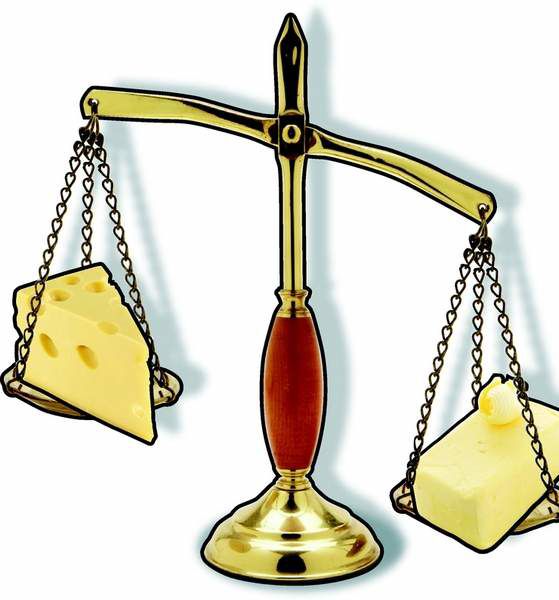Cheese isn’t always bad
Published 4:00 am Thursday, December 22, 2011

- Not all saturated fats are created equal.Illustration by Greg Cross The Bulletin
You don’t have to break up with cheese after all.
Just in time for the final rush of holiday indulgences, a new study suggests that you can go ahead, have a little.
A small study published in the American Journal of Clinical Nutrition concluded that eating cheese did not increase LDL or so-called “bad” cholesterol, more than one’s normal diet would.
“This gives you a little permission to eat some cheese,” said Mary Ann Johnson, a professor in foods and nutrition at the University of Georgia and a spokeswoman for the American Society for Nutrition. “The holidays are a great time to enjoy. As snack foods and holiday foods go, cheese does have a healthy (amount of) protein, and it tastes good.”
The study also concluded that a diet that incorporated hard cheeses lowered one’s bad cholesterol in comparison to a diet that incorporated butter. So, if faced with a choice between buttery shortbread cookies or slices of cheese, one could deduce that cheese is the healthier choice. The study aimed to illustrate that not all saturated fats affect people in the same ways.
Even armed with some indication that eating cheese is OK, moderation is still in order, and some cheeses are healthier than others.
“Hard cheeses have lower fat and more flavor so you don’t have to eat as much if you’re eating for flavor,” Johnson said.
“I would recommend that people enjoy cheese in moderation and eat cheese as part of an overall healthy diet that is rich in whole-grain foods, vegetables, fruit and lean sources of protein,” she said. She also recommends people experiment with unfamiliar cheeses from all over the world.
Lynne Oldham, a registered dietitian with St. Charles Bend suggested using grated or shredded cheeses because you can still get some of the cheese flavor but it’s easier to use smaller quantities. It’s also easier to use smaller quantities when using stronger flavor cheeses such as Parmesan, Asiago, extra-sharp cheddar or even Gorgonzola.
She recommended shopping for lower-fat cheeses that are made with part skim milk, such as mozzarella cheese or string cheese. Some other healthier options include goat cheese, ricotta and Neufchatel, a lighter alternative to cream cheese.
The study
In the study, 49 participants between age 22 and 69 underwent two, six-week dietary intervention periods, during which a portion of their normal dietary fat intake was replaced with either hard cheese or salted butter. The grams of cheese versus butter varied, to keep the grams of fat equal. Participants underwent a two-week period between intervention periods during which they ate their normal, habitual diets, and only a very small amount of low fat dairy — typically milk for coffee or tea. Then participants switched to the other kind of saturated fat.
Researchers tested participants’ blood periodically for cholesterol, markers of inflammation, glucose and insulin, as well as blood pressure.
The cheese period resulted in a 5.7 percent lower total cholesterol level, and a 6.9 percent lower “bad” cholesterol level compared to the butter period.
Of particular interest, the study’s authors noted, was that cheese intake did not increase one’s bad cholesterol compared to a normal diet, despite data indicating that participants consumed more total fat and saturated fat during the cheese period than the normal diet period.
Johnson, who was not involved with the study, said the study “could be great news for cheese lovers.”
However, she added, it’s unclear from the study what else participants might have consumed along with the cheese or the butter that could have played a role in how the comparable saturated fats were metabolized during the test periods.
“For example, cheese naturally contains protein, so this additional protein could have muted the effects of the fat in cheese on their blood lipids (fats). Or maybe they ate more whole-grain foods with their cheese with more fiber and this helped mute the effects of the fat in the cheese on their blood lipids,” she said.
And, she added, since this is just one relatively small study it won’t change what nutrition experts believe about dairy products. “We will continue to recommend low-fat dairy foods,” Johnson said.
American Society for Nutrition spokesperson Shelley McGuire said in a news release that followed the release of the study, “Results from the study on high-fat cheeses reinforce something we all know. The relationship between what we eat and how healthy we are is complex.
“Although experts constantly urge us to limit saturated fat intake, both genetics and the types of foods we eat can make a big difference as to whether this recommendation is actually useful,” McGuire said. “In other words, when it comes to dietary recommendations, one size does not fit all.”






